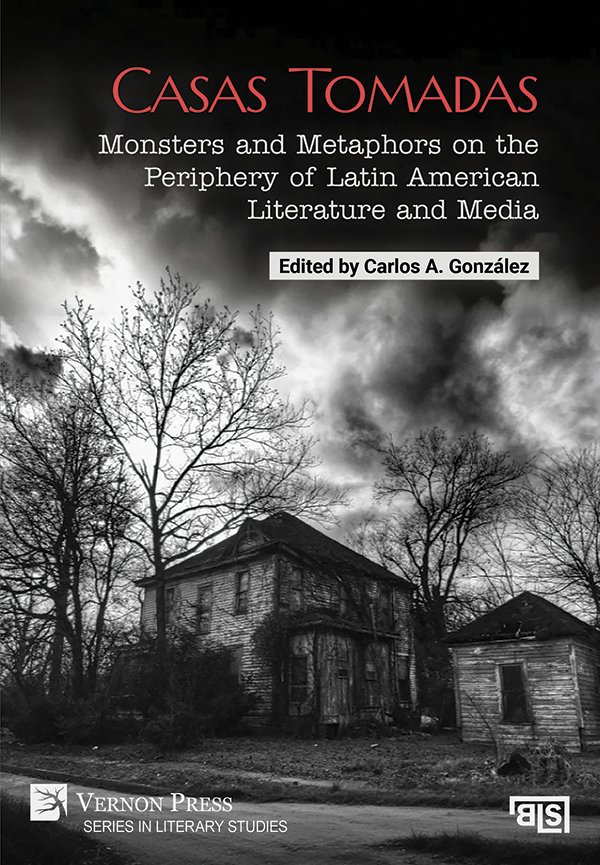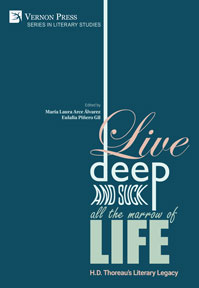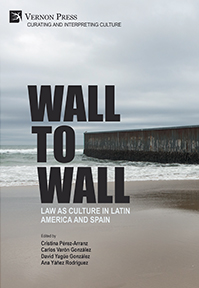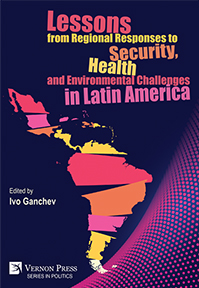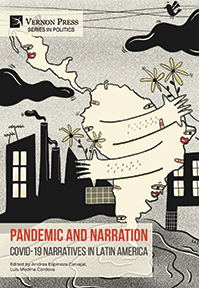Casas Tomadas: Monsters and Metaphors on the Periphery of Latin American Literature and Media
Carlos A. González (Ed.)
by Jorge Sánchez Rivera (Boston University), Olivia Holloway (USMA West Point), Lina Angulo Amaya (Georgetown University), Lisa Viviani (Western University), Fabio Andrade (Vassar College), Andrea Garza Erdmann (Harvard University), Andrea Tinnemeyer , Elisabetta Rodio (Cornell University), Velebita Koričančić (Anahuac Mexico University / National Autonomous University of Mexico), Elzbieta Sklodowski (Washington University)
Purchase this book
(click here to change currency)
Carlos González makes a brilliant contribution to humanistic studies of Latin America by soliciting and collecting the inspired essays in "Casas Tomadas: Monsters and Metaphors on the Periphery of Latin American Literature and Media." To confront current challenges to understanding our natural and political environment, the register of the monstrous as more strange than horrifying will capture readers' attention and stimulate urgent reflections about ways to interpret and to coexist with the planet and with one another.
Dr. Doris Sommer
Ira and Jewell Williams Professor of Romance Languages & Literatures
African and African American Studies
Harvard University
Uneven, disproportionate, abnormal: monsters are all that resist clear definitions and depictions. And yet, we cannot help but stare at them, albeit fearful that they might stare back at us. This volume is a rebel gaze at the eyes of those monsters, in a quest to understand their role in contemporary Latin American fiction. Reader, beware!
Caio Esteves de Souza
Harvard University
This book is an immersion into the nooks and crannies of contemporary Latin American cultural products, allowing the reader to transit in a variety of ways where old figures of terror have been reinvented, and others have emerged: from the vampire as a pestilential entity to the carnal revenants who evoke the disappeared. At the same time, "Casas Tomadas" installs a new canon based on the predominance of women artists, who disrupt government/patriarchal structures to reveal alternative forms of understanding monstrosity and shed light on a perpetual violence. In this sense, all the contributors address the grip of the unreal to show that horror houses reality in its most abject and pure sense.
Helen Flor Garnica Brocos
Romance Languages and Literatures,
Harvard University
'Casas Tomadas: Monsters and Metaphors on the Periphery of Latin American Literature and Media' examines how Latin American writers, filmmakers, and artists use monstrosity to reflect on marginalization, identity, and social trauma. This volume brings together close analyses of literature, film, and visual art from across Latin America, exploring how the monstrous symbolizes resistance to cultural, political, and historical oppression.
Organized into four sections—Night Lights, In the Grip of Monsters, Echoes in the Darkness, and Sinister Spaces—the book offers case studies on works by Mariana Enríquez, Samanta Schweblin, Issa López, and others. Each chapter reveals how monsters, from mythic figures to supernatural landscapes, serve as potent metaphors for issues like queer and feminist activism, postcolonial haunting, and socio-political violence. Contributors engage with genres from horror and the Gothic to speculative fiction, situating monstrosity within Latin American experiences of violence, trauma, and resilience. Distinct for its interdisciplinary approach, 'Casas Tomadas' will serve as a key resource for students and researchers in Latin American Studies, Cultural Studies, and Gothic and Horror Studies. Its focused structure makes it ideal for classroom adoption, while its fresh perspectives on Latin American Gothic and the politics of monstrosity offer new insights for scholars in queer and postcolonial theory.
Introduction: Monsters and the Margins
Part One: Night Lights
Chapter 1 Mermaids, Werewolves, ‘Humanimals’ and Unnamable Monsters: A Review of Monsters in Contemporary Literature of the Latin American Southern Cone
Jorge Antonio Sánchez Rivera
Boston University
Chapter 2 Monsters, Mirrors of Ourselves: Liminalities of Knowledge in Contemporary Adaptations of Brazilian Mythology
Olivia Holloway
USMA West Point
Part Two: In the Grip of Monsters
Chapter 3 Reformulaciones de la Monstruosidad: Las Malas Como “Contra-Activismo”
Lina Angulo Amaya
Georgetown University
Chapter 4 El Vampirismo en Las cosas que perdimos en el fuego de Mariana Enríquez
Lisa Viviani
Western University
Chapter 5 Disturbing the Real: Reclaiming the Monstrous in Contemporary Brazilian Cinema
Fabio Andrade
Vassar College
Part Three: Echoes in the Darkness
Chapter 6 The Revenant and Reality: Postmortem Politics and Horror Vérité in Issa López’s Vuelven (2017)
Andrea Garza Erdmann
Harvard University
Chapter 7 “They’d talk in circles”: Discursive and (In)visible Monsters in Mariana Enríquez’ The Dangers of Smoking in Bed
Andrea Tinnemeyer
Independent scholar
Chapter 8 Comala, Capitaloceno, y Comunidad: Los Monstruos de Pedro Páramo
Elisabetta Rodio
Cornell University
Part Four: Sinister Spaces
Chapter 9 Misfits and Mouthfuls: Samanta Schweblin’s Uncanny Embodiments
Carlos A. González
Harvard University
Chapter 10 Home as a Death Trap: Narrating Monstrosity of the House in Guadalupe Dueñas’ “Historia de Mariquita”
Velebita Koričančić
Anahuac Mexico University / National Autonomous
University of Mexico
Chapter 11 Monsters at Home: Post-Soviet Subversions of the Caribbean Gothic in Cuban Women’s Literature and Art
Elzbieta Sklodowska
Washington University
List of Contributors
Index
Carlos A. González is a PhD candidate in the Romance Languages and Literatures Department at Harvard University, specializing in horror, the Weird, and speculative fiction in Spanish and French literature. With a focus on Latin American and Francophone Weird narratives, González’s research examines how monstrosity, marginality, and ethics converge to challenge the reader. They have published and presented on topics including Latin American women’s neo-Gothic literature, heterotopic French fiction, and Queer and Crip criticism within both contemporary and medieval monster narratives in literature and film. González’s dissertation-in-progress investigates the figure of the monster across historical periods in Weird literature, arguing that literary monstrosity offers insights into interpersonal relationships through the ethical philosophy of Emmanuel Levinas. Their work draws on interdisciplinary training in critical theory and comparative literature to highlight how Gothic and Weird genres uniquely challenge ethical and social norms. González lives in Cambridge, Massachusetts, with their partner, shih tzu, and the creature living under their bed.
monstrous bodies, liminality, Latin American Gothic, resistance narratives, speculative realism, feminist horror, mythological subversion, cultural trauma, peripheral identities, uncanny spaces, narrative embodiment, alternative modernities, transgressive aesthetics, memory and haunting, socio-political critique
Subjects
Language and Linguistics
Series
Series in Literary Studies
Bridging Languages and Scholarship
Related services
Download print-friendly flyer Download HQ coverSee also
Bibliographic Information
Book Title
Casas Tomadas: Monsters and Metaphors on the Periphery of Latin American Literature and Media
ISBN
979-8-8819-0171-4
Edition
1st
Number of pages
248
Physical size
236mm x 160mm

